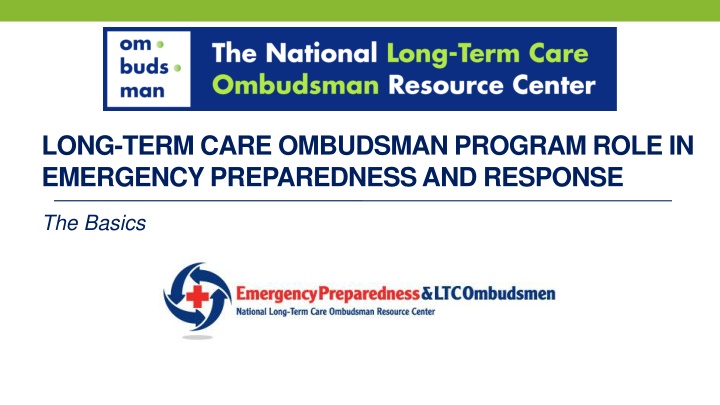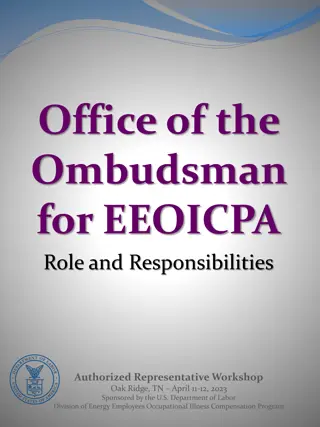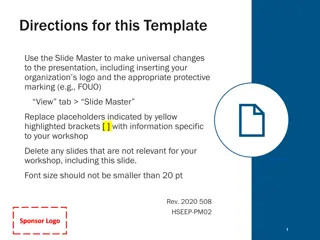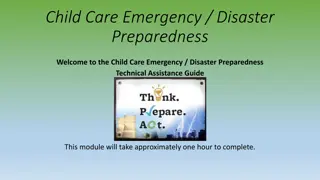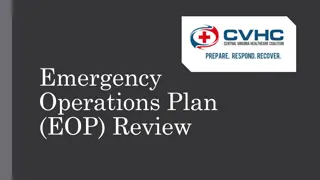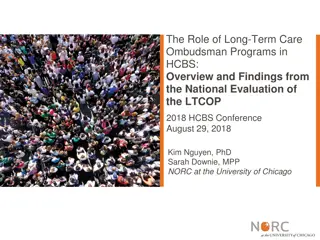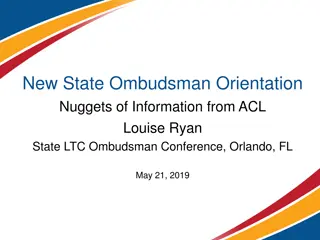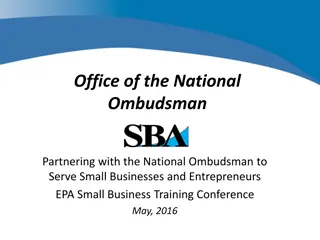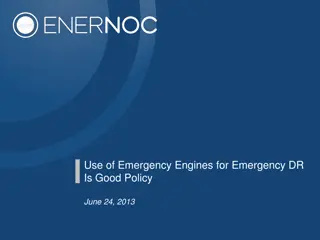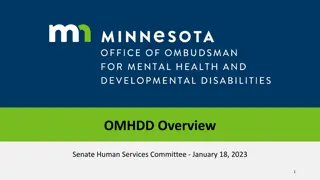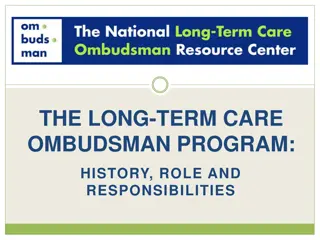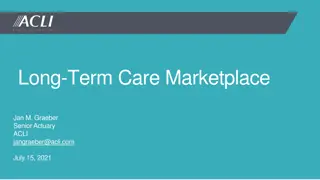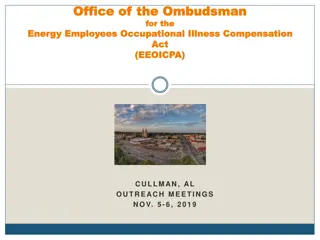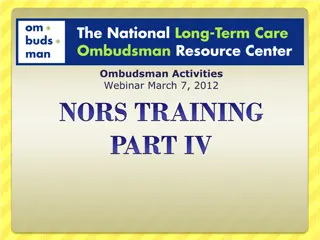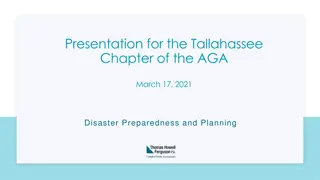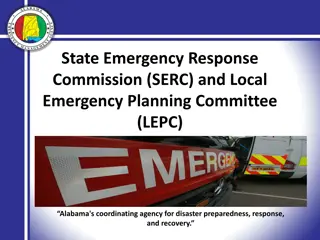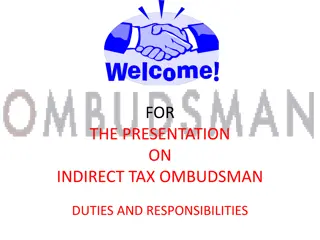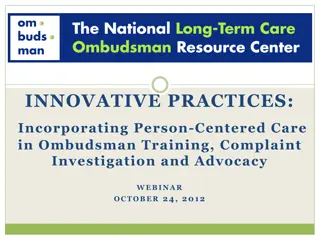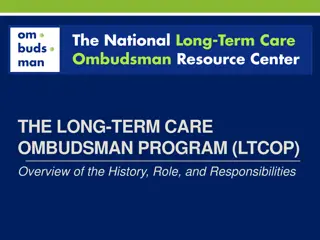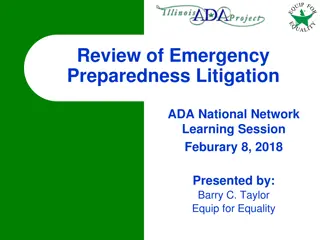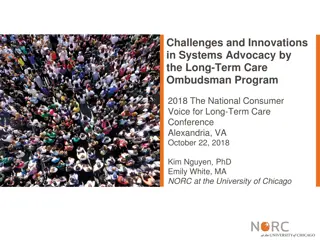Long-Term Care Ombudsman Program: Role in Emergency Preparedness and Response
The Long-Term Care Ombudsman Program plays a crucial role in emergency preparedness and response by providing support, training, and advocacy for long-term care residents. The program focuses on enhancing skills to handle complaints and represent resident interests during emergencies. Key terms, responsibilities, and planning agendas are discussed to ensure effective responses during various emergencies.
Download Presentation

Please find below an Image/Link to download the presentation.
The content on the website is provided AS IS for your information and personal use only. It may not be sold, licensed, or shared on other websites without obtaining consent from the author.If you encounter any issues during the download, it is possible that the publisher has removed the file from their server.
You are allowed to download the files provided on this website for personal or commercial use, subject to the condition that they are used lawfully. All files are the property of their respective owners.
The content on the website is provided AS IS for your information and personal use only. It may not be sold, licensed, or shared on other websites without obtaining consent from the author.
E N D
Presentation Transcript
LONG-TERM CARE OMBUDSMAN PROGRAM ROLE IN EMERGENCY PREPAREDNESS AND RESPONSE The Basics
2 Disclaimer The National Ombudsman Resource Center (NORC) is a project of the U.S. Administration for Community Living, Department of Health and Human Services, operated by the National Consumer Voice for Quality Long-Term Care (Consumer Voice). Grantees undertaking projects under government sponsorship are encouraged to express freely their findings and conclusions. Points of view or opinions do not, therefore, necessarily represent official Administration for Community Living policy. This project was supported, in part, by grant number 90OMRC0002-01-00, from the U.S. Administration for Community Living, Department of Health and Human Services, Washington, D.C. 20201.
3 About NORC The National Long-Term Care Ombudsman Resource Center (NORC) provides support, technical assistance, and training to Ombudsmen and representatives. Objectives are to enhance the skills, knowledge, and management capacity of the state programs to enable them to handle residents complaints and represent resident interests in both individual and systems advocacy.
Agenda Emergency Preparedness Planning Personal Responsibilities Long-Term Care Facility Responsibilities Long-Term Care Residents Long-Term Care Ombudsman program Emergency Response Long-Term Care Ombudsman program responsibilities Casework Discussion General Discussion Resources Review
Key Terms Emergency: Any incident, whether natural, technological, or human-caused, that requires responsive action to protect life or property. Under the Robert T. Stafford Disaster Relief and Emergency Assistance Act, an emergency means any occasion or instance for which, in the determination of the President, Federal assistance is needed to supplement State and local efforts and capabilities to save lives and to protect property and public health and safety, or to lessen or avert the threat of a catastrophe in any part of the United States. First Responder: Federal, state, and local emergency public safety, law enforcement, emergency response, Emergency Medical System, hospital emergency facilities, and related personnel, agencies, and authorities.
Emergency Preparedness Personal Responsibilities
Emergency Preparedness Personal Responsibilities 1. Develop a safety plan for your immediate family and any persons for whom you are a caregiver. 2. If you have advance notice of possible emergencies, get fuel for vehicles and generators, and extra cash.
Emergency Preparedness Personal Responsibilities Prepare Boxes for Home Food and water Batteries and flashlights Electronics cords and chargers Weather radio Medicines Diapers and formula, if needed Pet food
Emergency Preparedness Personal Responsibilities Prepare a Box for Vehicle Food and water Flashlight and batteries Phone charger Cash Paper list of phone contacts Masks & First Aid supplies Specific items for your region
Emergency Preparedness Personal Responsibilities If you work in an office building: Prepare an emergency bag or backpack include snacks, water, comfortable shoes, flashlight and batteries, masks, other items essential for you. If you are a caregiver, have children, or spouse/partner: Know the emergency plan for their facility, center, office building. Find out where people may be transferred or sheltered. Know the building s emergency plan. Identify a friend or family member that everyone will contact to update on status after an emergency. Participate in building evacuation drills, active shooter drills, etc.
Emergency Preparedness Long-Term Care Facility Responsibilities
Emergency Preparedness Nursing Facility Responsibilities CMS Emergency Preparedness (EP) Final Rule - implementation 11/15/2017 Required to develop emergency plans based on risks assessments and: Update the emergency plan annually Develop EP policies and procedures and update them annually. The policies and procedures must include plans for subsistence needs and temperature controls. Develop a communications plan Create a training plan and provide training at least annually Conduct drills and two exercises. One community based, full-scale exercise and one optional full-scale or tabletop exercise. Have Emergency and Standby Power Systems
Emergency Preparedness Nursing Facility Responsibilities CMS FAQ regarding Generators (June 2017) and operations of air- conditioning and heat system. Maintain temperatures to protect residents health & safety. Safe & sanitary storage of provisions. CMS does not recommend what type of alternate energy source. If a generator is used, then it must have the capacity to run a HVAC system. A generator is required for facilities where residents use life- support equipment.
Emergency Preparedness Long-Term Care Facilities (PLACEHOLDER FOR ANY STATE SPECIFIC EP GUIDANCE FOR NURSING FACILITIES AND RESIDENTIAL CARE COMMUNITIES)
Emergency Preparedness Residents Facility staff could empower residents and help reduce their anxiety about emergencies by: Informing residents of the facility EP Plan Including residents in drills Inviting First Responders to visit the facility and meet residents Involving residents in building their personal Go-Bag Confirming resident ICE (In Case of Emergency) contacts
Consumer Education https://theconsumervoice.org/uploads/files/issues/emergency-preparedness-factsheet-final-june.pdf
Emergency Preparedness Long-Term Care Ombudsman Program (LTCOP)
Emergency Preparedness Long-Term Care Ombudsman Program (LTCOP) The Older Americans Act (OAA) and the federal regulations require Ombudsman Programs to: Provide services to assist residents in protecting their health, safety, welfare, and rights Represent the interests of residents before governmental agencies
Emergency Preparedness Long-Term Care Ombudsman Program (LTCOP) EMERGENCY PREPAREDNESS CHECKLIST References to the LTCOP 1. Member of State Emergency Planning Committee 2. Publize information regarding clearinghouse (resident tracking) to LTCOP 3. State Survey Agency and LTCOP staff contact the healthcare facility to determine the status of the facilities in affected areas as soon as possible. Exception: regulatory and ombudsman representatives are in areas under mandatory evacuation.
Emergency Preparedness Long-Term Care Ombudsman Program (LTCOP) https://www.cms.gov/Medicare/Provider-Enrollment-and- Certification/SurveyCertEmergPrep/Downloads/SandC_EPChecklist_Persons_LTCFacilities_Ombudsmen.pdf
Emergency Preparedness Long-Term Care Ombudsman Program (LTCOP) PLACEHOLDER FOR STATE LTCOP POLICY AND PROCEDURES REGARDING THE PROGRAM S ROLE IN EMERGENCY PREPAREDNESS AND RESPONSE (INCLUDING POLICIES AND PRACTICES REGARDING PROGRAM PRACTICES DURING INFECTIOUS DISEASE OUTBREAKS).
Emergency Preparedness Long-Term Care Ombudsman Program (LTCOP) Ombudsman programs are not First Responders. First Responders include Firefighters Law Enforcement officers Emergency Medical Technician (EMTs)
Emergency Preparedness Long-Term Care Ombudsman Program (LTCOP) As Ombudsman program representatives become familiar with: Local emergency agencies and plans especially pertaining to facilities Emergency plans of facilities State or regional clearing house of information for facility residents evacuations Maintain hard copies of current contact information for facilities, Resident Council leadership, other Ombudsman program representatives, and appropriate agencies
Emergency Response Long-Term Care Ombudsman Program (LTCOP) Check on assigned facilities. Ensure residents rights are protected prior to, during, and after evacuation. If you live in the evacuation order area, follow instructions on the emergency agency first and check on residents by phone if possible. Provide information about conditions and any evacuation to the regional and state ombudsman office. Take urgent action to help obtain the resources and assistance residents need to be safe and, if they have been evacuated, find their loved ones and relocate to an area/facility or other setting of their preference. Track, if possible, the impact of the disaster on the residents.
Emergency Response Long-Term Care Ombudsman Program (LTCOP) DO: Encourage the resident to talk Work to develop trust Present optimism Anticipate emotions such as anxiety Counsel residents about rights Provide information Complaint investigation and resolution DO NOT: Argue with a resident Give orders Take an emotional and/or behavioral response to stress personally Exclude the resident in decision- making
Case Discussion #1 Ms. Garza and Ms. May were relocated to a different facility after a local disaster. When they returned to their original facility they were told they could not share a room.
Case Discussion #2 Mr. Brown s daughter tells you her dad s hearing aids were left behind during evacuation and was destroyed in the facility fire. The fire was a result of a large wildfire and was a state and federally declared emergency. She wants the facility to pay for the replacements of the hearing aids.
Case Discussion #3 Residents of a residential care community were moved to another facility after their facility suffered water damage from a flood. Residents lived in the new facility for 12 weeks before returning after renovation to the original facility. Providers are now fighting over residents incomes.
ACL LTCOP Model EP Policies and Procedures Functions & responsibilities of State Ombudsmen and representatives regarding EP Coordination & communications with others Provision of LTCOP services Training on EP for representatives Resident & family EP education Information & consultation to facility providers http://ltcombudsman.org/uploads/files/issues/EmRespo nse_ModelPPLTCO-11-23-15_Final.pdf
Model Policies Principles and Ombudsman Program Work Resident-centered focus System level representation of residents interests Coordination and communication Emergency Preparedness
Resources Centers for Medicare & Medicaid Services (CMS) Emergency Preparedness Rule https://www.cms.gov/Medicare/Provider-Enrollment- and-Certification/SurveyCertEmergPrep/Emergency-Prep-Rule Administration for Community Living (ACL) https://ltcombudsman.org/uploads/files/issues/EmResponse_ModelPPLTCO-11-23- 15_Final.pdf NORC https://ltcombudsman.org/issues/emergency-preparedness TRACIE Healthcare Emergency Preparedness Information Gateway https://asprtracie.hhs.gov/cmsrule
Additional Information (PLACEHOLDER FOR STATE INFORMATION AND RESOURCES)
Contact Information INSERT PRESENTER CONTACT INFORMATION
Do You Receive NORC Emails? Join NORC s database to receive webinar notifications, the Ombudsman Outlook (quarterly e-newsletter), and more. To receive our emails directly, use this link to sign up now: https://ltcombudsman.org/sign-up This Photo by Unknown Author is licensed under CC BY
Connect with us: www.ltcombudsman.org ombudcenter@theconsumervoice.org cid:image003.jpg@01CFB310.A36779F0 The National LTC Ombudsman Resource Center cid:image004.jpg@01CFB310.A36779F0 @LTCombudcenter Get our app! Search for "LTC Ombudsman Resource Center" in the Apple Store or Google Play This project was supported, in part, by grant number 90OMRC0002-01-00, from the U.S. Administration for Community Living, Department of Health and Human Services, Washington, D.C. 20201. Grantees undertaking projects under government sponsorship are encouraged to express freely their findings and conclusions. Points of view or opinions do not, therefore, necessarily represent official Administration for Community Living policy.
